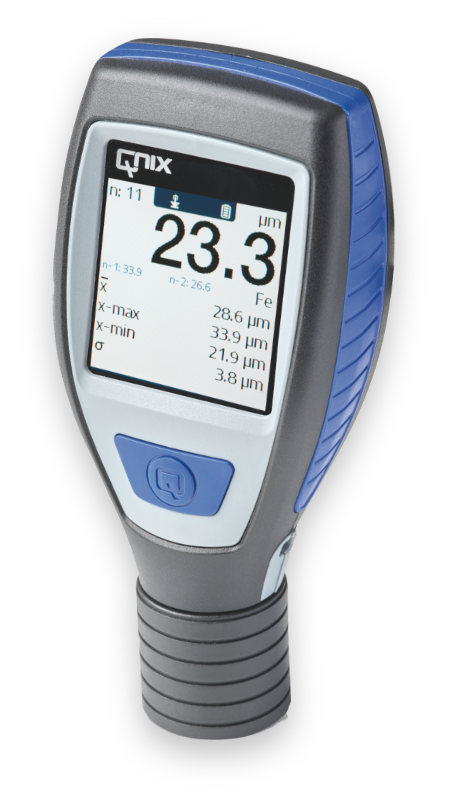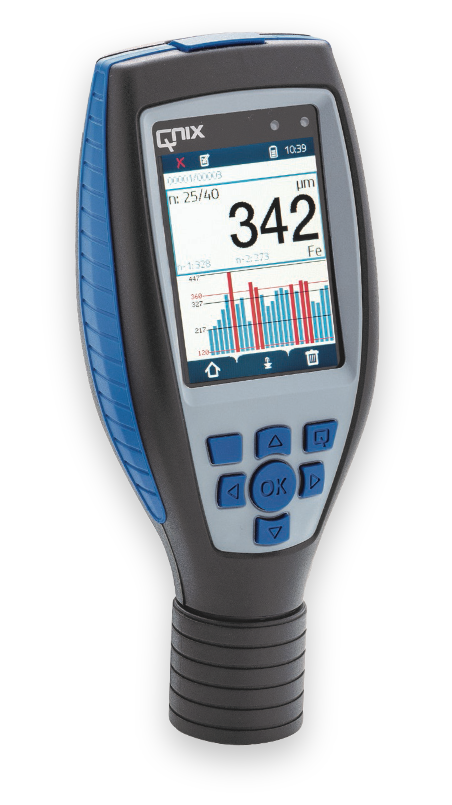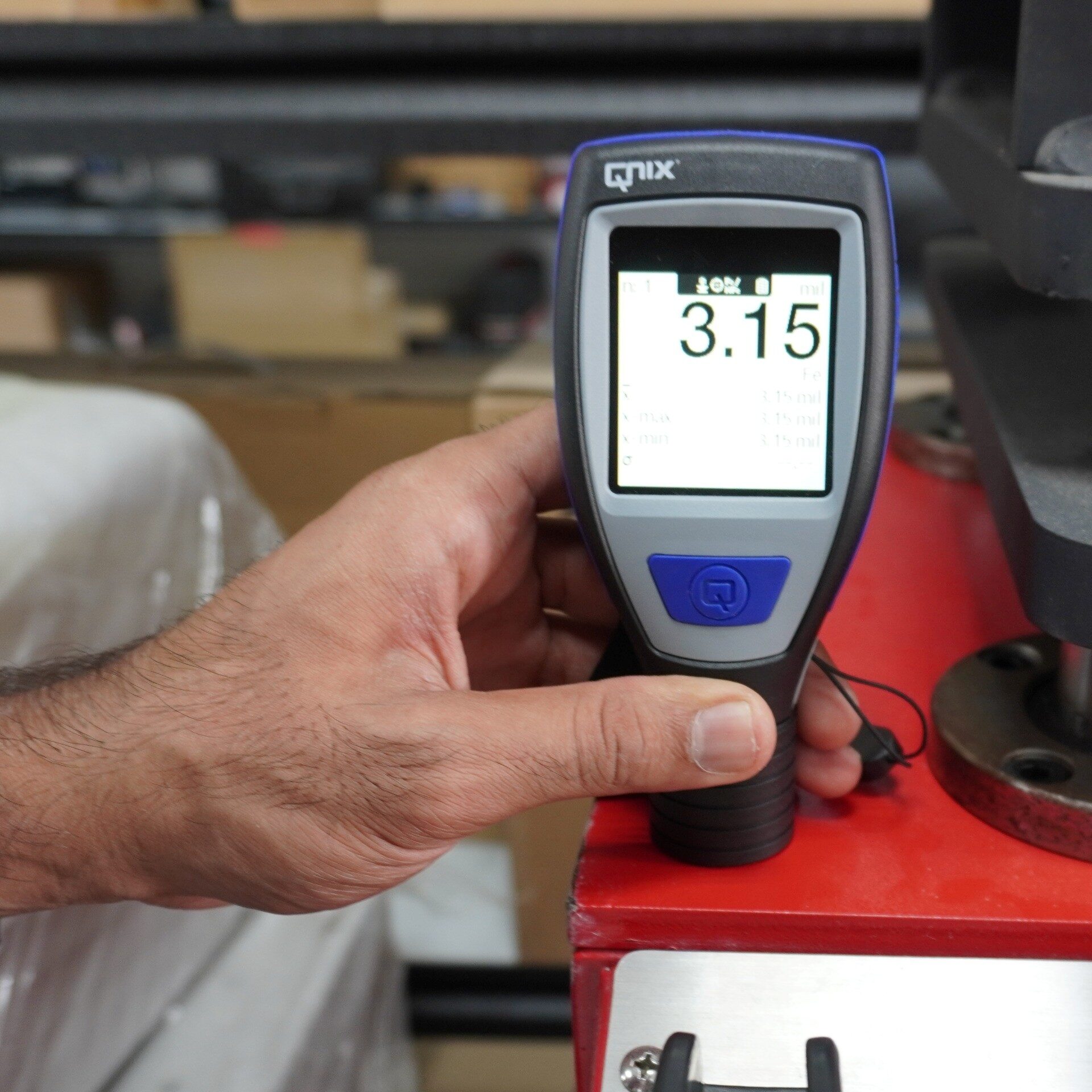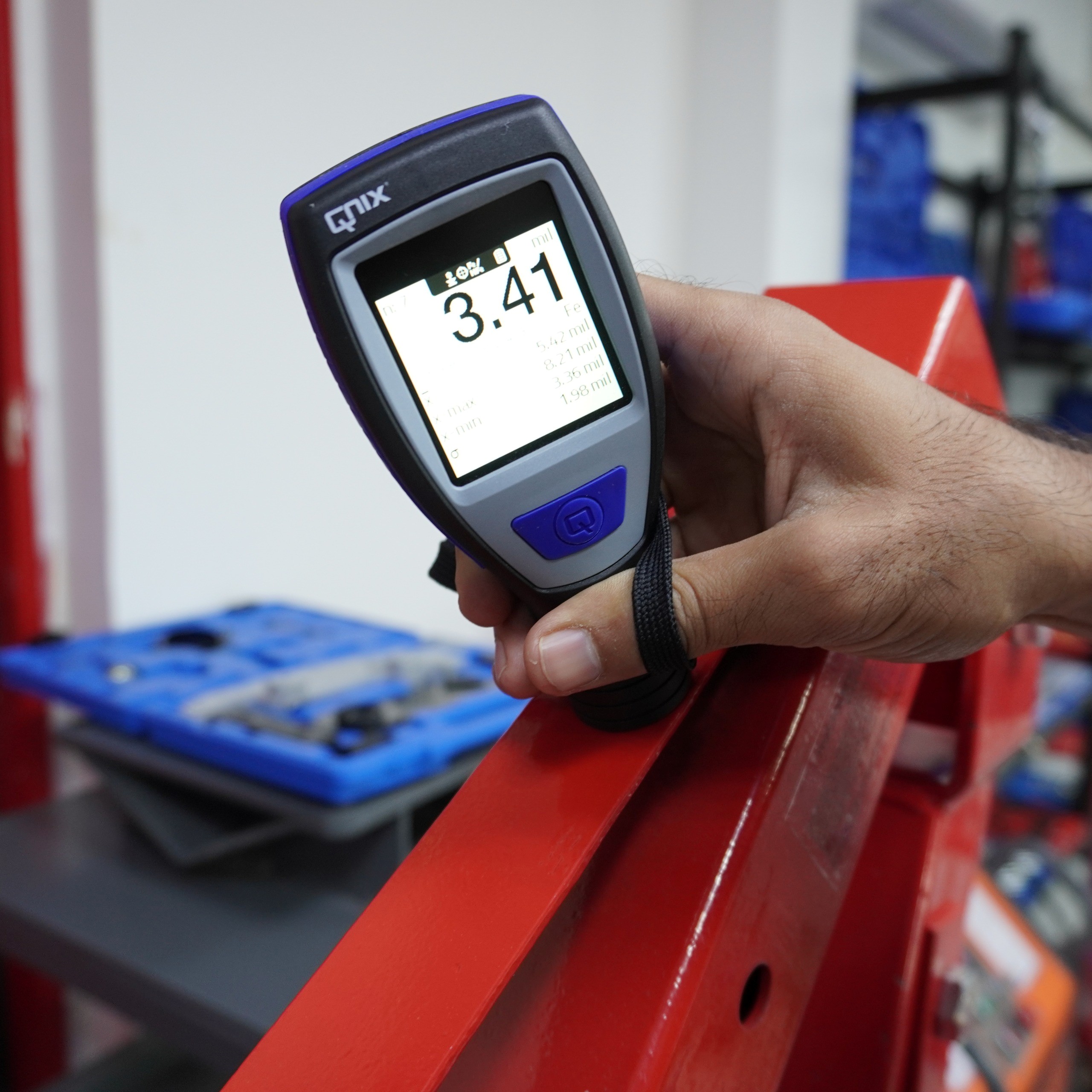Easy coating thickness measurements in heavy-duty corrosion protection
Our QNix® coating thickness gauges deliver reliable measurements in no time. This ensures perfect coating, extends the service life of your equipment, and helps you make the right decisions every time. The operation is extremely easy. The devices are robust and built for tough environments. With QNix®, you always stay at the cutting edge of technology.
Always a good choice: QNix® for heavy-duty corrosion protection
To help you confidently meet the challenges of harsh environments, we offer two robust and precise coating thickness gauges: the QNix® 9500 and the QNix® 5500. When it matters most, you can rely on both. They stand out for their easy operation, high measurement accuracy, and practical features that make your daily work significantly easier.

QNix® 5500
- Extremely durable: Protects against dust and splashing water – perfect for tough everyday use
- Fast and efficient: Quicker measurements thanks to automatic material detection
- Compact: Easy one-handed operation with a rotatable display

QNix® 9500
- Fast and precise: Also measures complex coating systems – ideal for demanding applications
- Flexible and easy to use: Modular design with interchangeable probes and user-friendly operation
- Perfect documentation: The integrated software lets you create custom reports and keep everything in view
Where are QNix® coating thickness gauges used?
Coating thickness measurements are needed wherever steel is exposed to heavy stress. For example, offshore installations are constantly exposed to saltwater, and pipelines pass through different climate zones. Bridges, ships, and facilities in the chemical industry also face challenges from moisture and high temperatures. Precise measurement helps detect corrosion early and avoid costly damage.
Offshore installations
Oil platforms and wind turbines are constantly exposed to saltwater and storms. If the protective coating becomes too thin, corrosion can spread unnoticed. Regular measurements prevent costly damage and ensure long-term stability.
Pipelines
Kilometers of pipelines transport oil, gas, or chemicals through various climate zones. Fluctuating temperatures, moisture, and aggressive substances take their toll on the material. Continuous coating thickness measurements prevent premature material fatigue and ensure the highest safety standards.
Shipbuilding
Ships are exposed to wind, waves, and saltwater every day. Especially below the waterline, precise coatings are crucial to prevent rust and deposits. With accurate coating thickness measurements, shipyards and shipping companies ensure that their vessels remain operational for a long time.
Chemical industry
Tanks, pipelines, and production facilities are exposed to aggressive substances and high temperatures. Faulty protection can lead to material fatigue, dangerous leaks, or production downtime. Precise measurements make it possible to verify whether the coating can withstand all these stresses.
Standards & regulations in heavy-duty corrosion protection
Standards and regulations form the basis for reliable quality in corrosion protection. They ensure that measurement results—regardless of the device or operator—are precise and comparable. In areas such as offshore installations, bridges, or pipelines, every measurement counts. By understanding the true condition of your coatings, you guarantee optimal protection and lasting stability for your facilities.
Our QNix® coating thickness gauges comply with all major international standards, such as ISO 2178, ISO 2360, and ISO 2808, as well as the relevant DIN and ASTM specifications. With our certified coating thickness gauges, you can detect even the smallest deviations in coating thickness. Rely on maximum safety and well-founded decisions.
Would you like to learn more about our measuring devices for heavy-duty corrosion protection? Contact us—we will be happy to advise you personally.

Challenges in heavy-duty corrosion protection
Irregular coatings often result from improper application or natural aging processes. This means that some areas of a steel structure are less protected than others. Many measuring points are hard to reach—think of offshore installations or long pipelines, where regular inspections are often difficult.
Extreme environmental conditions such as high humidity, salty air, and strong temperature fluctuations put additional stress on coatings. This can cause the protection to wear down or crack more quickly. Different materials—from strong steel to more sensitive alloys—often require different measurement methods.
Strict regulations also require that coating quality is thoroughly documented and regularly inspected. Only with precise coating thickness measurement can you detect errors early and take targeted corrective action. This helps you avoid system failures, save on expensive repairs, and extend the lifespan of your structures.

Answers to frequently asked questions
Which industries are QNix® coating thickness gauges suitable for?Which industries are QNix® coating thickness gauges suitable for?
Our devices are used in many fields. This includes, for example, the metal industry—such as automotive manufacturing, railways, steel industry, mechanical engineering, shipbuilding, and aircraft construction. Our measuring devices are also in demand in the plastics and chemical industries. In electroplating, they are used for anodizing, chrome plating, or galvanizing. In addition, vehicle appraisers and paint shops (car dealerships, body shops, and experts) use our measuring devices. Maintenance and repair companies, as well as inspection organizations, also benefit from them. Finally, our devices are used in research and laboratory settings.
Can I Get Help Choosing the Right Device?
Yes, we are happy to support you. Are you looking for a simple device for the automotive sector? Or do you need a solution for demanding tasks in surface finishing? We will help you find the right QNix® model.
Are QNix® devices waterproof?
They are not suitable for underwater measurements. However, our devices are very robust and withstand demanding environments, such as in corrosion protection or shipbuilding. In addition, they are protected against dust and splashing water according to IP64.
Can the device measure on plastic or other non-metallic materials?
No. For such materials, we recommend an ultrasonic measuring device, which we do not currently offer in our range.
Does the measuring device need to be calibrated regularly?
There is no legal requirement for calibration. However, we recommend an annual inspection at our facility to ensure accuracy and to issue an up-to-date calibration certificate.
Can the devices measure on different materials?
Yes, our devices measure steel, aluminum, copper, and zinc. They are designed to be precise and easy to use. As a rule, no calibration or probe change is required.
Is there training or support available for the devices?
Yes, we offer training so you can make full use of our measuring devices. If you have any questions or issues, our support team is always available to assist you. Contact
Is the device delivered with batteries?
We deliver it with standard batteries. However, you can also easily use rechargeable batteries.
Which probe is suitable for very small geometries and measuring surfaces?
The QNix® 9500 with a pencil probe and customized user calibration is ideal for narrow or hard-to-reach areas.
Does surface roughness affect the measurements?
Yes, you should take that into account. With a model from QNix® 9500 Serie you can compensate for roughness using user calibration. A mean zero adjustment also provides more precise results here.
Can the devices measure on carbon (automotive)?
Unfortunately, that’s not possible. The rough structure of the material leads to inaccurate measurements.
What is the maximum surface temperature for coating thickness measurement devices?
Our devices cover a wide temperature range. They can be used at temperatures between -20 °C and +70 °C. Outside of this range, accuracy may decrease.
Which simple measuring device do you recommend?
Das QNix® 4600 oder das QNix® 5500 sind robuste Einsteigermodelle mit leichter Bedienung und zuverlässigen Ergebnissen.
How is the data transmission carried out?
Via a USB interface cable. This connection has proven to be particularly secure and reliable.
Does the accuracy vary depending on the measuring range?
No, the accuracy remains the same regardless of the measuring range. You can find the exact values in our technical specifications.
Get in touch with us.
We look forward to hearing from you.
Simply select the relevant topic and let us know how we can assist you. Our team will get in touch with you promptly and answer all your questions.
Your contact person
Metin Tek
Director Sales & Marketing
Head of Sales & Marketing
Tel: +49 221 91 74 55-23
Mobile: +49 160 92 75 69 97
E-Mail: m.tek@automation.de

